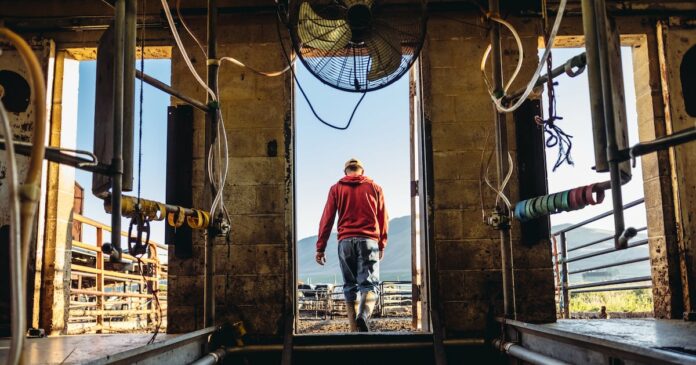The dairy industry in the United States faces a critical dilemma as President Donald Trump’s administration continues to push for mass deportations and strict measures against illegal immigration. With threats of imposing 25% tariffs on Mexico and Canada, as well as the declaration of a national emergency at the southern border to combat illegal migration, the fate of over one million undocumented farmworkers, including those working in dairy, hangs in the balance.
Immigrants play a crucial role in the US dairy industry, accounting for approximately half of the labor force. Research by the National Milk Producers Federation reveals that the majority of dairy farms, responsible for nearly 80% of US milk production, rely on immigrant labor. Eliminating immigrant workers could have devastating consequences, leading to a significant decrease in dairy herd size, milk production, and the number of dairy farms, ultimately resulting in a substantial increase in milk prices.
Public opinion on undocumented workers in the US is divided. While a majority of Americans believe that undocumented immigrants should have a pathway to legal status, a significant portion opposes this idea, citing concerns about rewarding lawbreakers, unfair treatment of legal migrants, and resource allocation. The issue of undocumented workers has become even more contentious in recent years, as migration numbers have fluctuated, with a notable decrease in encounters at the US-Mexico border due to enhanced enforcement measures.
The labor force in the US dairy industry is predominantly composed of Hispanic immigrants from Mexico and Guatemala, with limited English proficiency and lower levels of education. Wages for dairy workers vary, with many earning below-average salaries and working long hours. The industry’s reliance on foreign labor is driven by the shift of domestic workers to other sectors and the high costs associated with hiring local employees, as outlined in research by Michigan State University.
Efforts to address labor shortages in the dairy industry have been hindered by restrictions on the H-2A visa program, which is primarily designed for temporary or seasonal agricultural work. Dairy operations, which require year-round employment, face challenges in accessing the program. The National Milk Producers Federation has advocated for improved access to H-2A for the dairy sector, proposing solutions such as allowing for continuous employment of workers over multiple years.
As the debate on undocumented workers in the US continues to evolve, the dairy industry must navigate complex policy decisions and labor market dynamics. Research initiatives funded through 2028 seek to provide unbiased data on the impact of potential policy changes on both foreign and domestic labor forces. By addressing challenges related to access to the H-2A program and developing innovative solutions for securing a stable workforce, the dairy industry can adapt to changing immigration policies and ensure the sustainability of dairy production in the United States. In the realm of agriculture, particularly within the dairy industry, the issue of undocumented workers is a complex and sensitive one. Jaime Castaneda, representing the National Milk Producers Federation (NMPF), emphasized the importance of legislation to provide clarity on the status of these workers. The legal system plays a vital role in ensuring that individuals can move back and forth between their home countries while abiding by regulations.
Castaneda highlighted the necessity of including dairy workers in the H-2A visa program, which is designed for temporary agricultural workers. He stressed the need for different approaches to accommodate year-round dairy operations within this framework. The inclusion of dairy in the H-2A program would offer a structured pathway for legal employment in the industry.
However, navigating the legislative landscape concerning undocumented agricultural workers has proven challenging. Castaneda pointed out that various bills have been proposed over the years, including the Farm Workforce Modernization Act of 2023. Despite passing twice in the House of Representatives, the Senate has yet to take up the legislation. This legislative gridlock has stalled efforts to provide a clear legal status for undocumented workers in the agricultural sector.
The Farm Workforce Modernization Act aims to create a pathway for undocumented workers in agriculture to obtain CAW (Certified Agricultural Worker) status by demonstrating their employment history in the United States. This proposed legislation is crucial for ensuring the safety and well-being of all workers in the industry. Castaneda emphasized the importance of passing such legislation to establish a fair and effective legal system for agricultural workers.
Castaneda highlighted the significance of undocumented workers in agriculture, emphasizing their essential role in feeding America. He lamented the political obstacles that have hindered the passage of legislation to address the status of these workers. Despite the challenges, he underscored the importance of finding a solution that prioritizes the safety and rights of all individuals involved.
In the current political climate, Castaneda acknowledged that border security remains a contentious issue. He emphasized the need to address border control concerns before tackling other pressing issues related to undocumented workers in agriculture. Once border security is addressed, he suggested that a comprehensive approach be taken to address the complex issue of undocumented workers in the industry.
Castaneda called for a system that allows individuals to register and work legally in the United States, particularly in sectors where there is a shortage of American workers. By implementing a structured process for immigration and employment, the industry can ensure that essential workers have the opportunity to contribute to the agricultural sector while adhering to legal regulations.
In conclusion, the status of undocumented workers in agriculture remains a critical issue that requires legislative action. Jaime Castaneda’s insights shed light on the challenges and opportunities facing the industry. By prioritizing the passage of comprehensive legislation and addressing border security concerns, the agricultural sector can create a more secure and sustainable environment for all workers.




